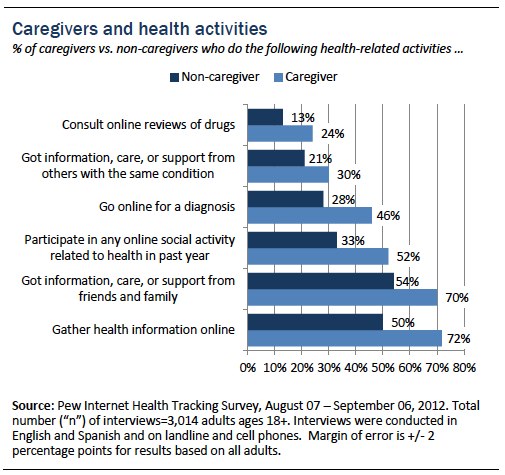39% of U.S. adults are family caregivers, up from 30% in 2010
Being a caregiver seems to change how people pursue health information, online and offline
WASHINGTON (June 20, 2013) — Nearly four in ten U.S. adults (39%) are caring for an adult or child with significant health issues, according to a new Pew Research Center survey. That is up from 30% of U.S. adults in 2010. Caring for a loved one is an activity that cuts across most demographic groups, but is especially prevalent among adults age 30 to 64 years old, a group traditionally still in the workforce.
Caregivers are heavy technology users and are much more likely than other adults to take part in a wide range of health-related activities.

“More Americans are finding themselves on the front lines of health care as caregivers to a loved one, and often with little warning,” says Susannah Fox, associate director of the Pew Research Center’s Internet & American Life Project and lead author of the report. “Caregivers vividly illustrate a primary truth about the social impact of the internet: it enables people to quickly gather information on a complex topic in order to make better decisions.”
In a previous study by the Pew Research Center, 47% of U.S. adults say it is likely that, at some point in their life, they will be responsible for caring for an aging parent or another elderly family member.
Demographic patterns bear out this prediction: People age 65 and older represented 12.4% of the U.S. population in the year 2000 but are expected to be 19% of the population by 2030.
This survey finds that fully 75% of U.S. adults age 65 and older are living with a chronic condition such as high blood pressure, diabetes, or heart disease. Numerous studies have shown that the day to day management of these complex medical cases falls squarely on family members and friends who may not be trained. But, as this study shows, caregivers are turning to every resource available to get the information and support they need.

Among other findings:
- Thirty-nine percent of caregivers manage medications for a loved one, such as checking to be sure pills are taken properly or refilling prescriptions. Just 7% of caregivers use online or mobile tools, such as websites or apps, to do so.
- Nine in ten caregivers own a cell phone and one-third have used it to gather health information (significantly higher than non-caregivers).
- 46% of caregivers say they have gone online specifically to try to figure out what medical condition they or someone else might have. By comparison, 28% of all non-caregivers say they have done so.
When asked about the specific impact of the internet:
- 59% of caregivers with internet access say that online resources have been helpful to their ability to provide care and support for the person in their care.
- 52% of caregivers with internet access say that online resources have been helpful to their ability to cope with the stress of being a caregiver.

About this study
The results reported here come from a nationwide survey of 3,014 adults living in the United States. Telephone interviews were conducted by landline (1,808) and cell phone (1,206, including 624 without a landline phone). The survey was conducted by Princeton Survey Research Associates International. Interviews were done in English and Spanish by Princeton Data Source from August 7 to September 6, 2012. Statistical results are weighted to correct known demographic discrepancies. The margin of sampling error for the complete set of weighted data is ±2.4 percentage points. In this survey there are 1,171 respondents who are caregivers. Margin of error for results based on caregivers is ±4 percentage points.
The Pew Internet & American Life Project is an initiative of the Pew Research Center, a nonprofit “fact tank” that provides information on the issues, attitudes and trends shaping America and the world. The Project is nonpartisan and takes no position on policy issues. Support for the Project is provided by the Pew Charitable Trusts.
Support for this study was provided by the California HealthCare Foundation, an independent philanthropy committed to improving the way health care is delivered and financed in California.
Media contact
Susannah Fox: sfox@pewresearch.org/pewresearch-org/internet and 202-419-4511